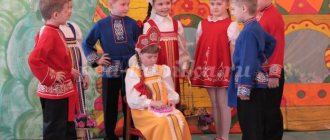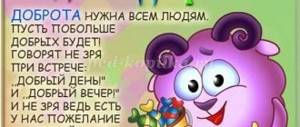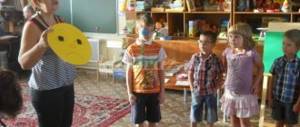Preview:
Summary of the washing process in the preparatory group
Educator: Popova T.A.
"Washing" process
Program content:
Quenching with cool water. Hand massage.
Target:
Be careful when washing. Teach finger massage to promote fine motor skills and blood circulation in the hands.
Continue to take care of yourself, your health, and remind you of the need for hygiene.
Including: the game "Magic Gate", memorization of a poem, word games.
Progress of the process: - “Washing hands”
The teacher suggests playing the word game “Magic Gate” (repeat the days of the week).
- Washing your hands (1,2,3,4,5 put the soap back)
- Massage each finger, make “gloves”: “This finger is a grandfather,
This finger is grandma, This finger is daddy, This finger is mommy, This finger is our baby.” And his name is... (Danilka).
- Then circular movements of the arms and cuffs. The result was “gloves”.
- Rinsing (you need to tilt your hands down)
- Squeeze.
What else needs to be done?
Children: Wash.
Educator: You must, you must wash your face in the mornings and evenings...
What else needs to be done?
Children: Blow your nose
Educator: For what?
Children: The nose collects germs, so it is necessary to clean the nasal mucosa.
Game: “Magic Gate” (any word game, consolidation)
Washing
In the sixth year of life, children are taught to independently perform hygiene procedures based on an understanding of their benefits and necessity. A summary of the regime moment “Washing” in the senior group may include the following tasks:
- Formation of the need to wash hands after visiting the toilet, if they are dirty and before eating.
- Consolidating knowledge about various hygiene items (comb, soap, toothbrush, towel, etc.)
- Conveying awareness of the importance of personal hygiene.
- Cultivating a positive attitude towards the washing process.
The teacher uses posters with drawings and short captions, poems, and riddles about hygiene items. He makes sure that the children roll up their sleeves, use soap correctly, do not splash water, turn off the tap, dry themselves with individual towels and hang them up. It is better not to use comparisons with other children. It is more useful to notice the personal progress of each student (“Today you yourself remembered that you need to roll up your sleeves”).
On the topic: methodological developments, presentations and notes
Goal: to show parents that their 6-7 year old child is going through a difficult period in life, to teach them to look at the world through his eyes, to try to understand him, to provide support...
Summary of a speech therapy lesson in a preparatory group for children with special needs “Development of horizons in the process of cognitive and research activities”
summary of a speech therapy lesson, development of horizons in the process of cognitive and research activities….
Publications on the topic:
“Water, water, wash my face.” Summary of an open demonstration of the routine moment of hand washing Age of children: 3-4 years Goal: to form and consolidate in children healthy habits that promote good health and a cheerful mood.
Analysis of the regime moment “Gymnastics after sleep and the hardening method” Date February 4, 2020 Teacher: Inspector: Age group: average Number of children: 11 (eleven) people 1. Regime moment –.
Summary of the game-activity for the middle group “Washing the doll” Summary of the game-lesson “Washing the doll” Prikhozhaeva O. S. Senior teacher of the GBDOU kindergarten No. 41 of the Primorsky district of St. Petersburg.
Summary of the regime moment. Formation of self-service skills in children Topic: Viewing routine moments Purpose: Formation of self-service skills in children (washing, eating skills, undressing for bed, getting up from bed)
Summary of the routine moment - organizing breakfast in the middle group. Summary of organizing breakfast in the middle group. Prepared by teacher Goldyreva S.V. Objectives: I. To attract children's attention to hygiene.
Summary of the routine moment “Lunch in the first junior group.” Objectives: 1. Continue to protect and improve the health of children. 2. Continue to create a culture of behavior while eating: use it correctly.
Summary of the routine moment “Organization for lunch” Goal: Formation of cultural and hygienic skills Social and communicative development - Update children’s needs for fulfillment.
Summary of the regime moment - preparation for a walk. Playing with a doll “Doll Nastya visiting the children” Program content: 1 Ensure that all children get ready for a walk in a timely manner 2 Form the correct sequence when dressing.
Summary of the routine moment in the afternoon in the senior group Educator: Krasnoperova Irina Valentinovna Raising the children. 1. Gradual rise. 2. Breathing exercises. 3. Hardening activities.
According to cognitive development
Abstract "Regimen processes in the older group for children with (OND)."
Author: Kozlova Larisa Gennadievna
Abstract “Regime processes in senior
group for children with (OHD)." The first half of the day. Reception of children.
7.15-8.10
Reception of children in a group.
Communication between the teacher and children: individual conversations, games for communication and creating a good mood in children and their parents. Organization of independent activities for children: different types of games, work in a corner of nature, visual arts. Create conditions for varied and interesting activities for children in the group. Formation of cultural and hygienic skills: use of a handkerchief, control over appearance, neatness of hairstyle. Formation of a culture of behavior: greetings, speak quietly and do not shout, demonstrate polite relationships with peers and adults. Morning exercises.
8. 10- 8.20 Preparation for morning exercises.
Morning exercises in the gym with musical accompaniment. Breakfast.
8.20 – 8.50 Hygiene procedures.
Attracting children's attention to hygiene procedures, reinforcing the rules of hand washing; organizing washing gradually, in small groups of children. Remind children of the rules for washing hands: roll up sleeves; soap your hands until foam forms; soaping hands and other procedures should be carried out over a sink: collect the required amount of water in your palms; wash your face with both hands; wash your hands up to the elbows with soap; wash your neck and ears; wash your hands; wipe your hands dry; use a personal towel; do not shake water from your hands. Carefully hang the towel in its place after washing. Children should not splash water and should keep the washroom tidy and clean. Competition games (older age), teacher's story about cleanliness; self-control of children; performance assessment. Table setting: conversation with the attendants; familiarization with the menu, announcing it to children; attracting children's attention to the aesthetic design of tables. Attracting children's attention to food; individual work to educate food culture; rules of etiquette; eat carefully; take bread and put food on a plate as much as you eat; eat in silence; chew with your mouth closed; use a napkin; control the children’s posture, try to ensure that the children eat all the food offered; be able to handle a spoon, fork, table knife; Chew food thoroughly. During the meal, the teacher must constantly cultivate cultural and hygienic eating skills. ODD. 9.00
-
9.55
Preparation for class: cleaning up toys;
switching attention to another type of activity; assessment of children's activities; organization after class. Walk.
9.55 -
12.15
The group needs to restore order before leaving; Remind children of the rules of behavior in the locker room. Preparing for a walk: creating interest; gaming techniques; individual conversations; selection of game material; motivation for children's activities during a walk. Dressing: sequence; going out for a walk. Before going out for a walk, draw children's attention to their appearance. The teacher eliminates obvious mistakes made by children during the dressing process. Educational objectives: the names of clothes and their purpose, as well as the names of individual parts of clothing, are fixed in the process of dressing, the vocabulary on the topic “Clothing” is being activated.
Observations on a walk. Outdoor games: 2-3 games of great mobility; 2-3 games of low and medium mobility; games of children's choice. Work on the site: motivation of children’s activities; determining the scope of work; distribution of duties; preparation of equipment; performing labor operations; equipment cleaning; performance assessment. Individual work on the development of movements and physical qualities. Independent gaming activity: creating conditions for the development of role-playing games; games with natural materials; other activities; individual work on art activities, speech development). 30 minutes before the end of the walk, the teacher transfers the children to a calmer activity - observations, verbal games or conversations are held. Before leaving the walk, children are given instructions for the upcoming activity - from putting the area in order to entering the group. Returning from a walk: games. 12.15-12.25
Children should leave their feet before entering the kindergarten and move quietly.
In the locker room, the teacher monitors the process of changing clothes and instills in children a careful attitude towards things and the sequence of undressing; and accuracy skills. Self-control of children; control and evaluation of their activities; free activity of children. Dinner.
12.25-13.05 Preparation for lunch.
Hygiene procedures: attracting children's attention to hygiene procedures; strengthening hand washing rules; competitive games (older age); teacher's story about cleanliness; self-control of children; performance assessment. Keeping your nose clean: use a handkerchief in a timely manner. Table setting: conversation with the attendants; familiarization with the menu, announcing it to children; attracting children's attention to the aesthetic design of tables. Attracting children's attention to food; individual work to educate food culture; rules of etiquette; performance assessment. Dream. 13.05-15.00
Getting ready for bed: hygiene procedures;
creating conditions for organizing sleep; going to bed. Making the bed: make the bed before going to bed; fold the blanket; straighten the sheets after sleep; shake off the sheets; fold the blanket in half; tidy up the bed after sleep. In the toilet :
use toilet paper;
wash your hands after using the toilet. Afternoon.
Raising children. 15.00-15.20 Gradual rise of children, communication between the teacher and the children.
Individual work with children, creating conditions for independent activity. Corrective gymnastics: preparation for corrective gymnastics, attracting the attention of children. Tempering activities: hardening, massage. Formation of cultural and hygienic skills: attracting children’s attention to hygienic procedures; hygiene procedures; strengthening hand washing rules; teacher's story about cleanliness; self-control techniques; assessment of children's activities; hand washing sequence; dressing sequence; control over appearance, neatness of hairstyle: comb hair if it is disheveled; comb your hair and braid it; keep your head neat. Formation of a culture of behavior; friendly relationships with peers and adults. Organization of independent gaming activities. Communication with children, individual work, games. Afternoon snack.
15.20-15.40 Preparation for afternoon tea, table setting;
conversation with duty officers; familiarization with the menu, announcing it to children; attracting children's attention to the aesthetics of table design. Attracting children's attention to food; individual work to develop food culture skills; rules of etiquette; assessment of children's activities; cleaning tables. Individual work on the instructions of a speech therapist.
15.40-17.45 Preparing for the walk;
creating interest; gaming techniques; individual conversations; selection of game material; motivation of children's activities. Dressing, practicing the sequence of dressing (game, verbal, visual, practical techniques). Outdoor games: 2 - 3 games of great mobility; 2 - 3 games of low and medium mobility; on children's choice. Individual work on the development of movements, physical qualities: independent play activities; creating conditions for the development of role-playing games; games with natural materials; individual work on visual arts and speech development; theatrical performance in the warm season. Children going home. Remind the child of the rules of good manners; the child must say goodbye to the children and the teacher. The teacher should have a positive attitude towards children for their next visits to kindergarten. comments powered by HyperComments



